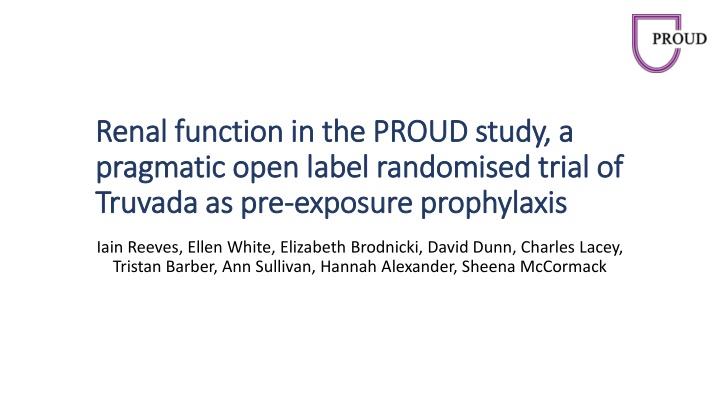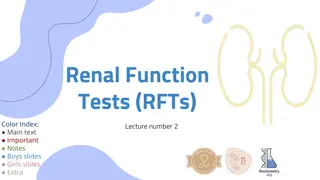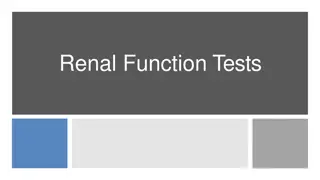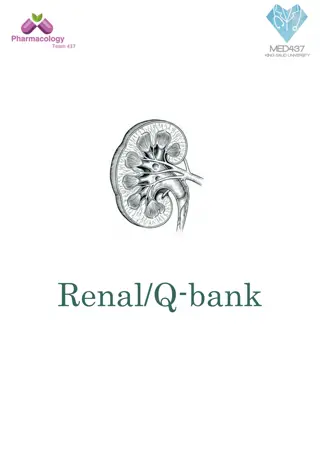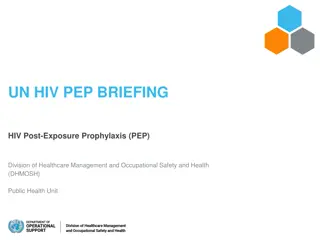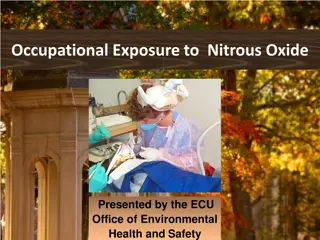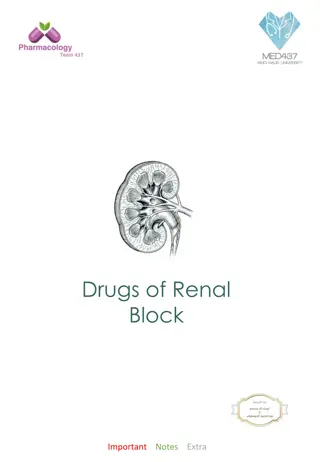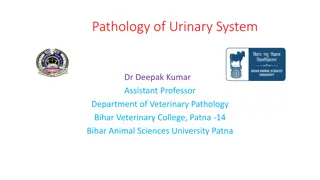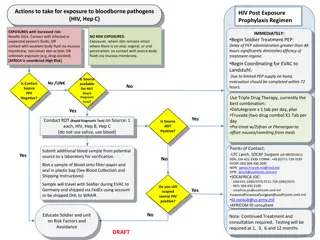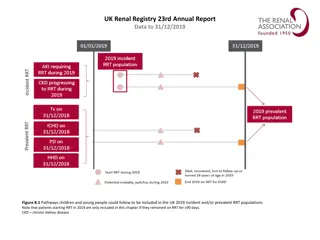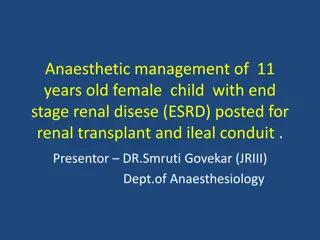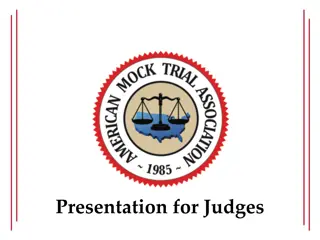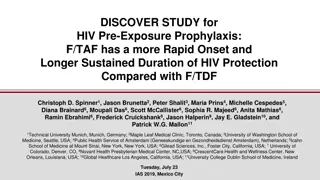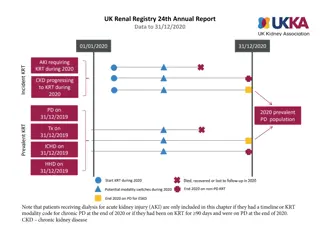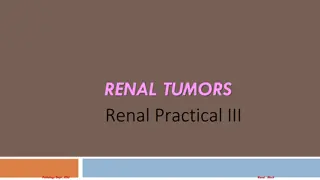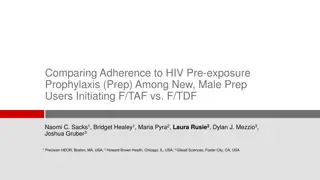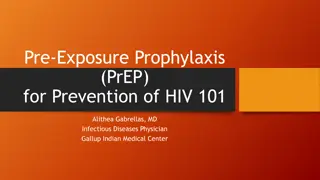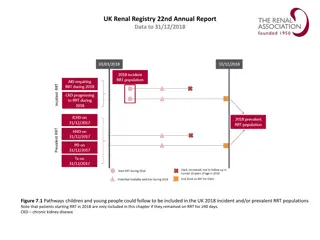Renal Function Monitoring in the PROUD Study: Truvada Pre-Exposure Prophylaxis Trial
Renal function in the PROUD study, a pragmatic open-label randomized trial of Truvada as pre-exposure prophylaxis, was monitored closely. No significant safety concerns were found, with similar renal adverse events between the placebo and Truvada groups. Regular monitoring included baseline serum creatinine and urinalysis, quarterly urinalysis, and annual serum creatinine tests. The study aims to analyze results as planned and describe study staff behavior regarding renal safety monitoring protocols.
Download Presentation

Please find below an Image/Link to download the presentation.
The content on the website is provided AS IS for your information and personal use only. It may not be sold, licensed, or shared on other websites without obtaining consent from the author.If you encounter any issues during the download, it is possible that the publisher has removed the file from their server.
You are allowed to download the files provided on this website for personal or commercial use, subject to the condition that they are used lawfully. All files are the property of their respective owners.
The content on the website is provided AS IS for your information and personal use only. It may not be sold, licensed, or shared on other websites without obtaining consent from the author.
E N D
Presentation Transcript
Renal function in the PROUD study, a Renal function in the PROUD study, a pragmatic open label randomised trial of pragmatic open label randomised trial of Truvada Truvada as pre as pre- -exposure prophylaxis exposure prophylaxis Iain Reeves, Ellen White, Elizabeth Brodnicki, David Dunn, Charles Lacey, Tristan Barber, Ann Sullivan, Hannah Alexander, Sheena McCormack
Disclosures Disclosures Gilead supplied Truvada used in the PROUD trial Dr Iain Reeves has received sponsorship to attend conferences, honoraria and speaker fees, amounting to < 10,000 from Gilead in the past year
PROUD Pilot GMSM reporting UAI last/next 90days; 18+; and willing to take a pill every day Randomize HIV negative MSM (exclude if treatment for HBV/Truvada contra-indicated) Risk reduction includes Truvada AFTER 12M Risk reduction includes Truvada NOW Follow 3 monthly for up to 24 months Main endpoints in Pilot: recruitment and retention From April 2014: HIV infection in first 12 months
Renal monitoring in PROUD Renal monitoring in PROUD No significant safety concerns in placebo controlled trials1 2: Renal adverse events / discontinuations similar Raised creatinine events similar In PROUD Truvuda recipients: Baseline serum creatinine and urinalysis for protein AND dispense drug (no screening visit) Month 1 and quarterly urinalysis Annual serum creatinine In presence of proteinuria on urinalysis ( 1 + protein) and no evidence UTI, then: Formal quantification by urine protein:creatinine ratio (uPCR) Serum Creatinine 1 Grant et al NEJM, 2010, 2 Baeten et al, NEJM 2012
Aims Aims To analyse results as planned Describe study staff behaviour in relation to renal safety monitoring protocol To analyse the results that emerged
Methods Methods Dataset 1 Baseline, month 12 and month 24 Baseline creatinine within 2 weeks prior to PrEP initiation Month 12 & 24 creatinine within 3 month window either side Dataset 2 All creatinine measurements Used exact time from date of PrEP initiation Multi-level modelling to account for multiple measurements, sporadic timing and missing measurements eGFR calculated using CKD-EPI equation* >60 = no kidney disease unless other evidence Analysis conducted in Stata 14.0 *most labs use MDRD
Baseline and M12 Baseline and M12 eGFR eGFR Median (IQR) eGFR: 120 Month 12 eGFR Baseline = 106 ( 93-115)ml/min 90 Month 12 = 102 (89-111) ml/min 60 40 40 60 90 120 Baseline eGFR
Baseline and M24 Baseline and M24 eGFR eGFR 120 Median (IQR) eGFR: Baseline = 106 (93-115) ml/min Month 24 eGFR 90 Month 24 = 99 (85-109) ml/min 60 40 40 60 90 120 Baseline eGFR
Renal function over 2 years Renal function over 2 years Completion rates of creatinine at baseline, m12 and m24 visits were 93%, 86%, 83% respectively. Many more serum creatinine measurements were done: Often each time patient had blood taken Potential bias in over-sampling where there were concerns about renal function
Multi Multi- -level model of level model of eGFR estimations over follow estimations over follow- -up eGFR considering all creatinine considering all creatinine up 105 100 95 90 eGFR 85 80 75 70 65 60 0 12 24 36 Months since PrEP initiation
Renal adverse events leading to Renal adverse events leading to interruption of interruption of Truvada Truvada Three individuals interrupted because of renal events One discontinuation1 One interruption, related to lithium co-administration no longer at risk and now discontinued One continues on Truvada Girometti et al, AIDS 2016
Conclusions Conclusions Truvada was generally very safe with a very small number of clinically relevant adverse events Changes in eGFR over 2 years were very modest Renal function was monitored more often than needed Urine data to follow
Acknowledgements (1) Study participants MRC CTU at UCL Sarah Banbury, Liz Brodnicki, Christina Chung, Yolanda Collaco-Moraes, Monica Desai, David Dolling, David Dunn, Mitzy Gafos, Sajad Khan, Brendan Mauger, Sheena McCormack, Yinka Sowunmi, Gemma Wood HIV & STI Dept, PHE Monica Desai, Sarika Desai, Noel Gill, Anthony Nardone, GUMCAD team, HIV team Clinics Vanessa Apea (Barts Health NHS Trust), Christine Bowman (Sheffield Teaching Hospitals NHS Foundation Trust), Michael Brady (Kings College Hospital NHS Foundation Trust), Martin Fisher (Claude Nichol Centre), Julie Fox (Guy s and St Thomas s NHS Foundation Trust), Richard Gilson (The Mortimer Market Centre), Charles Lacey (York Hospitals NHS Foundation Trust), Nicola Mackie (St Mary s Hospital), Alan McOwan (56 Dean Street), Iain Reeves (Homerton University Hospital NHS Foundation Trust), Gabriel Schembri (Manchester Centre for Sexual Health), Ann Sullivan (John Hunter Clinic for Sexual Health), Steve Taylor (Heart of England NHS Foundation Trust)
Acknowledgements (2) Trial Steering Committee Independent members: Mike Adler (Co-Chair), Gus Cairns (Co-Chair), Dan Clutterbuck, Rob Cookson, Claire Foreman, Stephen Nicholson, Tariq Sadiq, Matthew Williams Investigator members: Brian Gazzard, Noel Gill, Anne Johnson, Sheena McCormack, Andrew Phillips Gilead: Matt Bosse, Rich Clarke, Jim Rooney, Murad Ruf University of Liverpool: Saye Khoo Independent Data Monitoring Committee: Anton Pozniak, Simon Collins, Fiona Lampe Community Engagement Group Community: Yusef Azad (NAT), Gus Cairns (NAM), Rob Cookson (LGF), Tom Doyle (Mesmac), Justin Harbottle (THT), Marion Wadibia (NAZ), Matthew Hodson (GMFA), Cary James (THT), Roger Pebody (NAM) Clinics: Anthony Bains, Alan McOwan (Lead), MRC CTU at UCL: Sheena McCormack, Mitzy Gafos, Annabelle South Social Science Advisory Group Interviewers: Caroline Rae, Gill Bell, Michael Rayment, Sonali Wayal, Will Nutland, Mitzy Gafos Advisors: Ingrid Young, Ford Hickson, Lisa McDaid, Marsha Rosengarten, Nicolas Lorente, Agata Pacho, Elizabeth Poliquin, Anthony Nardone, Catherine Dodds, Adam Bourne, David Dolling, Sheena McCormack, Rob Horne
Baseline and follow Baseline and follow- -up comparisons up comparisons N = 84 baseline vs M12 pairs where baseline eGFR was 60-90 Majority (63/84, 75%) were >60 at M12 19 no M12 result 2 fell into 40-60 (confirmed?) N = 194 with baseline eGFR > 90 Seven individuals had a >20% decrease in eGFR at M1 Five of these NOT confirmed as returned to baseline on repeat test One stopped PrEP and was lost to follow-up Two had no further creatinine estimations All seven had normal urinalysis Four individuals had uPCR all normal
